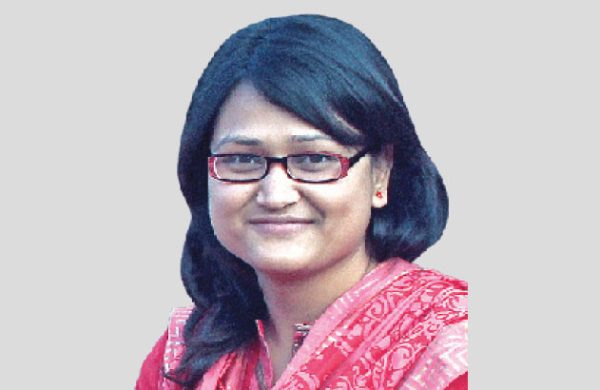Faith That Found Us First
- Update Time : Monday, June 2, 2025

—Kaniz Kakon—
Long before the applause, before certificates were framed and names remembered, there were voices—soft, steady, and unseen. They did not wait for medals to shine or for stages to rise. They spoke to the flicker in us when we ourselves were all shadows. These were not voices of authority but of faith—mothers with tired eyes, teachers with chalk-stained fingers, and friends with borrowed hope.
They dared to see what wasn’t yet real in a world that counts value only when it manifests. As Paulo Freire teaches, the oppressed are not waiting to be saved—they are waiting to be heard. And these early encouragers—these lantern-bearers—whispered light into silence. Their belief wasn’t charity. It was an act of radical recognition, a soul-seed planted in barren ground.
In Bangladesh, so many dreams are born into drought. A girl with eyes full of questions walks ten kilometers to a crumbling classroom. A boy memorises multiplication under a storm-battered tin roof. In their worlds, encouragement is not decoration—it is breath. Their names do not reach the headlines, but their stories rise like smoke from village fires—resilient, unfinished, profound.
Their obstacles are not singular; they are layered like sediment—poverty, patriarchy, remoteness, and silence. Kimberlé Crenshaw called it intersectionality; I call it the weight beneath their feet. And yet, when someone—anyone—says, “I see you,” that weight shifts. Hope doesn’t erase hardship, but it makes space for a step. In such moments, belief becomes a bridge—a quiet promise that you are more than what the world has reduced you to.
Politics, too, is a terrain of forgetting. History is often rewritten by those who survive it, not those who shape it. We honor the victors but erase the visionaries. Yet, democracy is not born in chambers—it is whispered in prison cells, chanted in village fields, scribbled in notebooks during blackouts. Frantz Fanon reminds us that liberation is not given; it is claimed. But what of those who first dared to name freedom long before it was fashionable?
In our own country’s journey, too many voices have been swallowed after the mission was achieved. Recognition came late—or not at all. These voices, these architects of justice, are not echoes but roots. And as new political seasons unfold, especially in our current moment of transition, the question lingers: will we remember those who dreamed the dawn while it was still dark?
But belief is not only memory—it is movement. It is the quiet certainty that something new can begin. Hannah Arendt called this natality: the miracle of beginning again. Every child who dares to speak, every woman who demands space, every activist who risks arrest—is enacting that miracle. Those who believed in us before we knew our names made space for this possibility. They gave us room to begin. Their faith is not linear—it loops forward. It urges us to become that voice for someone else. To stand beside a trembling student, to affirm the rural poet writing on borrowed paper, to tell the boy sweeping shop floors: you, too, are enough to start something sacred.
Dignity is not awarded. It is recognised. And recognition should never be reserved for the accomplished. The Universal Declaration of Human Rights opens not with achievement, but with birth: “All human beings are born free and equal in dignity and rights.” Yet how often do we delay that dignity?
We celebrate only what is visible. We love only what is proven. But the truest justice begins before the applause—with belief in what is becoming. We must build a culture that remembers not only those who succeed, but those who speak to the seed. In a nation with many silences and many storms, we need more early voices, more hands reaching forward before the fruit appears. Because in the end, a just society is not one that waits for the arrival—it is one that walks beside us as we begin.
And why is this needed now, more than ever? Because we are losing the language of faith in others. We are becoming systems of performance and productivity, measuring worth by outcomes and ignoring the hidden labor of perseverance. In schools, students are crushed under competitive grading but starved of affirmation.
In politics, youth are told to wait their turn while power recycles itself through familiarity. In families, expectations rise like tides, but love is rationed by success. What we forget is this: not every flower blooms early, and not every hero arrives with trumpets. We need to water what is still sprouting. We need to listen to voices before they grow confident. We need to create public spaces, policies, and institutions that reflect this ethic of early belief—not just in theory, but in action.
Encouragement is not a luxury. It is the emotional infrastructure of human rights. When a society invests only in what is already accomplished, it breaks the ladder for those still climbing. We need mentors in slums, scholarships that reach rural girls, public policies that ask not just “who succeeded?” but “who was overlooked?” Belief in the becoming must be seen as a democratic necessity—because without it, we recycle inequality. The dream of justice, if it is to be real, must begin in moments when no one is watching—when the world is quiet, and someone still says, “I believe in you.”
———————————————————————————-
The writer is an Assistant Professor in the Department of Philosophy at IUBAT and pursuing a Masters in Human Rights and Multiculturalism at University of South Eastern Norway


















